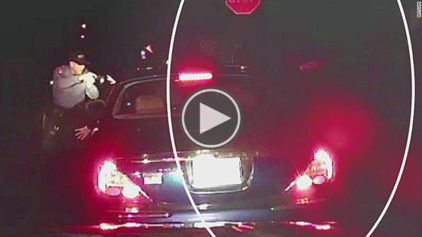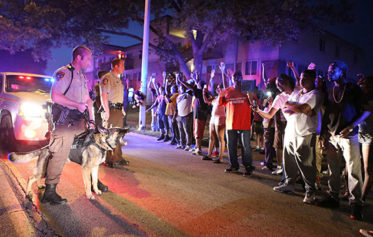After the release of footage showing yet another unarmed Black man being shot and killed by police in the southern New Jersey town of Bridgeton, leaders are calling on New Jersey state officials to step in and conduct the investigation into the bizarrely aggressive actions of the two Bridgeton officers, one white and one Black, who fired on the man.
Jerame Reid, 36, was killed on Dec. 30 of last year during a simple traffic stop, when the two officers stopped a black Jaguar driven by Leroy Tutt, 46, for rolling through a stop sign. In the video, we see one of the officers, Braheme Days, who is Black, ask the driver for his license, then quickly pull his gun on Reid, who is in the passenger seat.
The officer reaches into the car and appears to retrieve a gun from the glove compartment. Shortly after yelling expletives at Reid and warning that he will shoot him, he then fatally shoots Reid as he is getting out of the car evidently with both hands in front of his chest. Days’ white partner, Roger Worley, also fires his gun.
At one point, Days addresses Reid by his first name—although he never saw his identification. A report on NJ.com indicated that Days was one of the arresting officers when Reid was arrested last summer on charges of obstruction, resisting arrest, possession of narcotics and failure to appear in Millville Municipal Court. Reid spent about 13 years in state prison for shooting at three New Jersey State Police troopers when he was a teenager.
“I’m telling you, I’m telling you! Keep your (expletive) hands right there. Eh, eh, Jerame, you reach for something, you’re going to be (expletive) dead,” Days yelled.
Though the Cumberland County Prosecutor’s Office reportedly is investigating the use of deadly force in the fatal shooting, Black leaders are calling for an outside investigator. On Wednesday night, after the video was made public, protesters marched on the streets of Bridgeton, a small relatively poor town of predominantly Black and Hispanic residents about an hour south of Philadelphia.
“It’s been very, very tense since the video,” Walter Hudson Sr., the leader of the National Awareness Alliance, a group organizing the community of Bridgeton following the incident, told the Guardian. “The video itself is alarming.”
“They’re scared, they’re scared,” Hudson said. “For one, they want change. But on the other side they’ve been so degraded or harassed, they feel if they step up, they feel there will be retaliation when this dies down.”
“Local officials should not handle incidents such as this,” Rev. Al Sharpton said in a statement on Thursday. Sharpton has been pushing the automatic appointment of independent prosecutors in all police-involved shootings, as have legislators in states such as Pennsylvania and New York.
Georgia Congressman Hank Johnson is trying to circumvent the state-by-state process by introducing a bill in the U.S. House of Representatives last month to establish federal regulations dictating that special prosecutors handle cases in which police officers are accused of killing civilians. If states don’t comply, according to the bill, they would risk losing federal funding.
Most observers agree that even if the special prosecutor system doesn’t always result in the conviction of police officers or white killers of unarmed Black males, it will at least go far in giving the public more confidence in a criminal justice system that is widely perceived as unfair and illegitimate, particularly in the Black community.
Even across the races, there is a general consensus among Americans that when police officers are involved in killing American citizens, the matter should be handled by a special prosecutor, not the local prosecutor who works with the police on a daily basis, according to a Washington Post-ABC News poll.
In countries such as France and Spain, cases of police shootings, in-custody deaths and official corruption are automatically handled by an outside official, called an investigating magistrate.
Asked by the media for more information, first assistant prosecutor Harold B Shapiro, who is investigating the case, said, “Because a grand jury presentation must be considered, the [Cumberland County] prosecutor’s office must be circumscribed in its release of information.”
The county prosecutor, Jennifer Webb-McRae, recused herself because, she said, she knew Days from “the community”.
According to New Jersey law, a grand jury must be held unless the “undisputed facts” show the use of force was justified.


